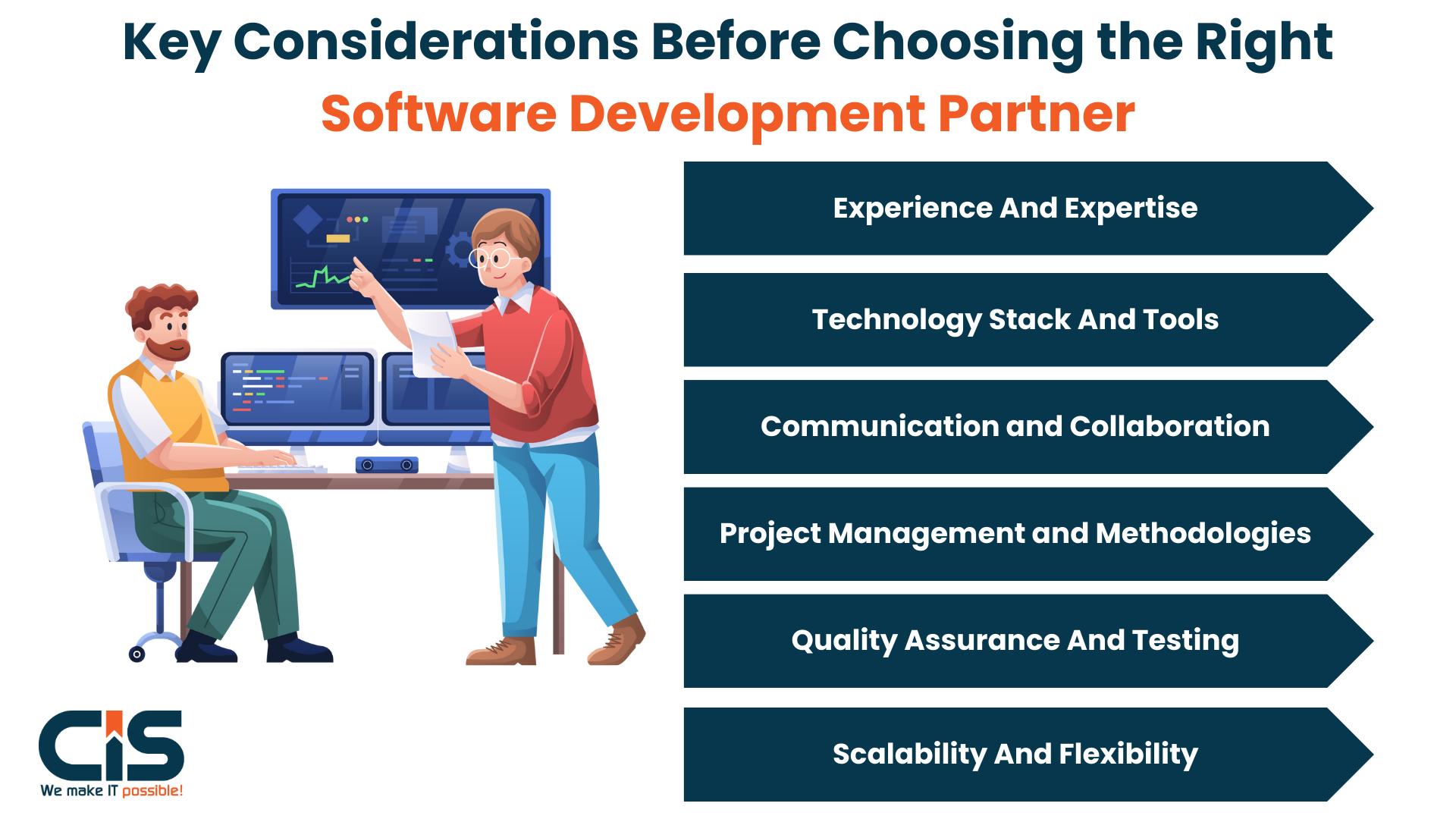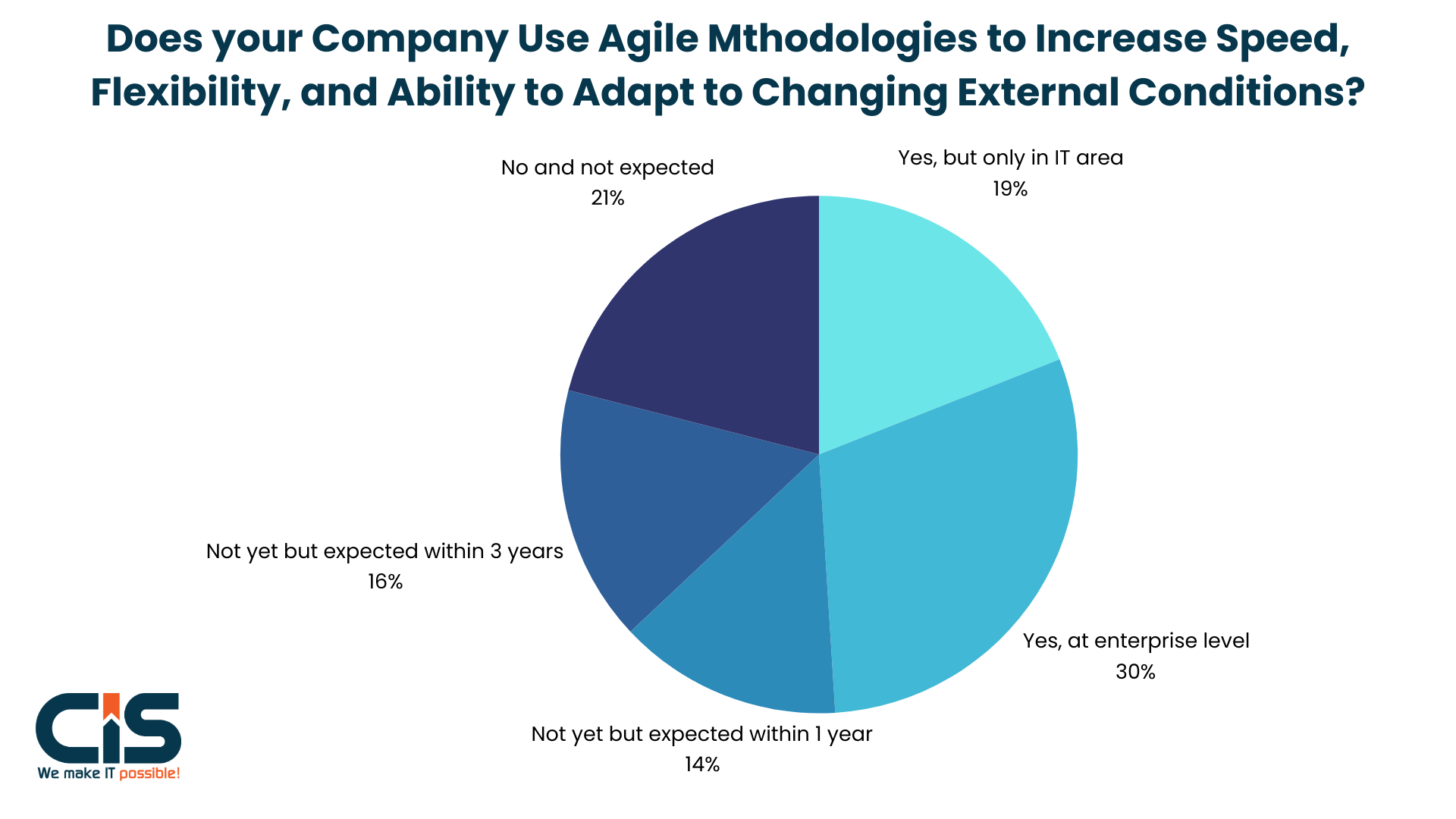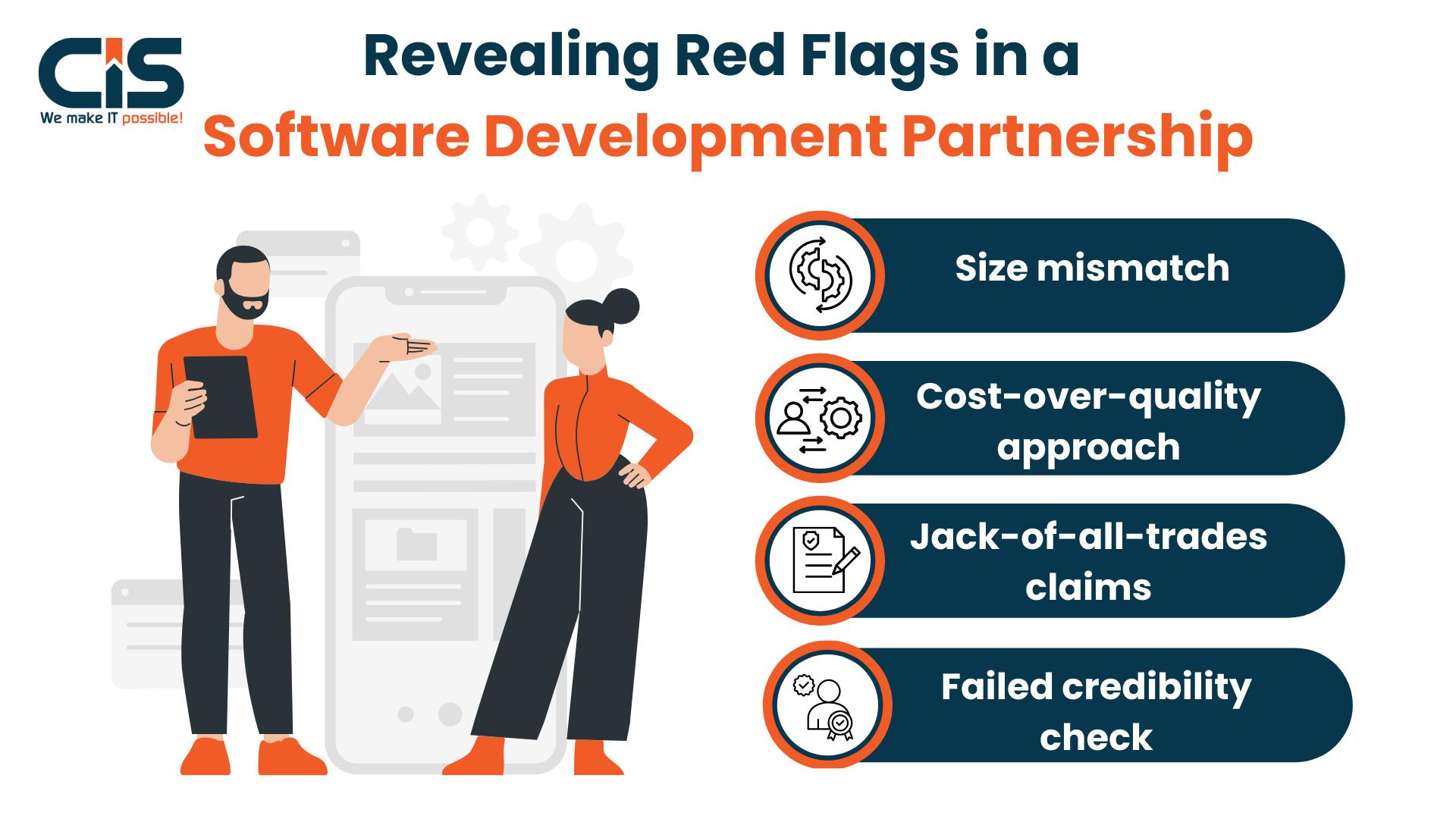Selecting a custom software development partner in fast-paced technological growth is essential for building up the successful performances of companies from different branches. Whether it is a one-of-a-kind software development project, software modernization, or creating an enterprise mobile application, selecting the potential partner plays a significant role in the process.
However, due to shifts in the software markets, it becomes a herculean task to search for a particular software development company. So, based on a few vital values, below is a list of strategies that may help you make a wiser choice. In this article, the reader will find the most important factors to pay attention to when selecting the right SD partner for your business.
Key Considerations Before Choosing the Right Software Development Partner

Looking for a software developer partner to work with, several factors need to be considered. Under the circumstances, these are the most critical factors that one needs to take into account before making the final choice. In 2024, the software market is expected to generate $704.10 billion in revenue, according to Statista. To enable you to choose the right software development partner that would work for your needs, here are some of the factors explained in this article.
Experience And Expertise
1. The Significance of Experience in Software Development
There are several factors that should be considered when selecting an organization to partner with in software development, with one being the experience of the partner. These experienced partners have probably worked on different projects and faced many issues in their careers, which enable them to get your project and needs addressed and solved.
The following are important things to remember:
- Select those companies which have experience in software development life cycle that can meet your business needs.
- Factors that should be taken into consideration include the duration the partners have been in practice and the nature of the clients they deal with.
- Find out whether they have worked on projects that are analogous to the one you are interested in.
2. Assessing the Expertise of a Software Development Partner
Partners should be assessed pertaining to their capability or competency before making a decision.
Here are some methods for achieving this:
- Determine whether their development team is proficient in and has the proper education in the field.
- Search for the signs of certifications or cooperation with well-known technology vendors (Microsoft, Amazon Web Services, or Google Cloud with references to specific fields).
- Look for their references or samples of similar work which they have done before.
3. Evaluating the Partner's Track Record and Portfolio
The background and experience of the software development partner are some of the decisive features that need to be investigated before making the decision.
Consider the following:
- Check their past projects to see if there was a similar project you have been working on.
- Search for testimonial videos or specific cases that would prove their competence in fulfilling the set goals of the particular project.
- Ask for references and contact the partners previous clients to find out more about their experiences with the partner.
Read More: Custom Software Development: Worth the Investment? Discover the Cost, Gain & Impact!
Technology Stack And Tools
Given the contemporary context in which digital tools predominantly dominate the global market, it is imperative to select the proper technology stack and tools for the custom software development needs.
Here are some considerations to keep in mind when selecting a software development partner:
1. Aligning technology stack with your project requirements:
- Understand your project requirements: Before choosing a reliable custom software development partner, have a clear understanding of your project requirements. Determine the necessary technologies, platforms, and frameworks that will be required to successfully develop your software.
- Assess partner's expertise in relevant technologies: Critically assess the partners' competency in certain technologies that are relevant to your project. Try to find familiarity with the specific programming languages that will be employed, like Java, Python, and dot. NET or visual script or Java script or framework such as React, Angular Laravel etc. Make sure the partner is familiar with the new technologies that he or she is to use in developing solutions.
- Scalability and future-proofing: Think about the compatibility of the technology stack and tools suggested by the partner with the further scale of the project. Specifically, will they effectively allow adding more users, features, and project types, making further configuration changes in the future? The decision should only be made in favor of a partner that is willing to offer you a solution that is as scalable as possible.
2. Assessing the partner's proficiency in relevant programming languages:
- Evaluate their experience: This is why make sure that your software development partner has worked with the programming languages needed for your project in the past. Their problem-solving skills, technical skills, coding, and debugging, as well as implementation of the solutions in those languages, are essential in creating a good end product.
- Check for certifications and qualifications: Certifications and qualifications, as stated above, are a second source of assurance to a partner on a programmer's proficiency in the languages. Choose the applicant with such accomplishments as Microsoft Certified Professional (MCP) or Oracle Certified Professional (OCP), as they prove the person's high level of proficiency.
- Request sample code or projects: To assess the partner's proficiency, ask for samples of their previous work in the relevant programming languages. Review their code quality, documentation, and the overall performance of the software projects developed.
3. Evaluating the partner's familiarity with software development tools:
- Research commonly used tools: Familiarize yourself with the widely used software product development tools in the industry. Look for tools that enable efficient collaboration, version control, project management, and testing.
- Assess the partner's tool expertise: Evaluate the partner's familiarity with these tools and their proficiency in using them. Look for experience with tools like Git, JIRA, Slack, or Docker. This will ensure smooth communication and workflow between your team and the software development partner.
- Consider tool customization and integration: Depending on your project requirements, consider how well the partner can customize and integrate these tools to meet your specific needs. This will help streamline the development process and ensure efficient project management.
Communication and Collaboration
Effective communication and collaboration are crucial for the success of any software development project. Here are some considerations to keep in mind when choosing a trustworthy software development outsourcing partner:
1. Establishing Effective Communication Channels:
- Seamless communication: Ensure that the partner understands your preferred communication channels, whether it's email, phone calls, video conferencing, or project management software. Good communication should be timely, clear, and consistent throughout the project.
- Accessibility and availability: Determine the partner's availability and response time. It's important to have quick access to them in case of any urgent issues or project updates.
2. Assessing the Partner's Communication Skills and Responsiveness:
- Prompt and clear responses: Evaluate how effectively the partner communicates with you during the initial consultation and throughout the development process. They should be able to understand your requirements, provide regular updates, and address any concerns or queries promptly.
- Active listening: A good software development partner will actively listen to your ideas, concerns, and feedback. They should be able to understand your vision for the project and effectively translate it into a technical solution.
3. Evaluating the Partner's Ability to Collaborate and Adapt to Your Team's Working Style:
- Collaboration experience: Determine if the partner has experience working in collaboration with other teams, such as designers, project managers, or other developers. This will ensure smooth coordination and cooperation throughout the project.
- Flexibility and adaptability: Evaluate the partner's ability to adapt to your team's working style, methodologies, and processes. They should be able to integrate seamlessly into your workflow, whether you follow Agile, Waterfall, or any other project management methodologies.
- Cultural fit: Consider the cultural fit between your team and the software development industry. Compatibility in terms of work culture, values, and communication styles can contribute to a more harmonious and productive collaboration.
Project Management and Methodologies
When selecting a software development partner, it is crucial to consider their project management approach and methodologies. This guarantees the seamless and effective operation of the development process. Some essential considerations are as follows:
1. Understanding the partner's project management approach:
- Clear and transparent process: The partner should have a well-defined project management approach that outlines the steps involved in the software development process. This includes requirements gathering, planning, development, testing, and deployment. Make sure their process aligns with your expectations and needs.
- Project documentation: The partner should provide clear documentation detailing project requirements, objectives, milestones, and deliverables. This ensures that everyone is in agreement and reduces the likelihood of misunderstandings.
- Regular progress updates: The partner should be able to provide regular progress reports and updates so you stay informed about the status of the project. This helps to identify any issues or delays early on and allows for prompt resolution.
2. Evaluating the partner's proficiency in Agile or other methodologies:
- Agile methodologies: Agile methods are a popular project management approach that emphasizes flexibility, collaboration, and iterative development. Assess if the partner is experienced in Agile methodologies like Scrum or Kanban. This allows for quick adaptations to changing requirements and ensures a more efficient development process. Roughly 30% of the Italian businesses polled by Statista state that they employ Agile at the corporate level to improve speed, flexibility, and adaptability.

- Waterfall or other methodologies: If your project requires a more sequential approach, consider whether the partner has experience with waterfall or other methodologies. They should be able to align their processes with your needs and deliver results accordingly.
3. Assessing the partner's ability to meet project deadlines:
- Track record of meeting deadlines: Review the partner's track record in delivering projects on time. Look for testimonials or references from their previous clients to ensure they have a history of timely completion.
- Time management practices: Inquire about their time management practices and how they prioritize tasks. A reliable partner will have efficient systems in place to meet deadlines and manage resources effectively.
- Contingency planning: Ask the partner about their approach to handling unexpected hurdles or delays. A proactive partner will have contingency plans in place to mitigate risks and ensure the project stays on track.
Quality Assurance And Testing
When choosing a software development partner, it is crucial to assess their approach to quality assurance and testing. Ensuring that your software solutions are of high quality and bug-free is vital for delivering a smooth user experience. Here are two key considerations in this aspect:
1. Assessing the partner's approach to quality assurance
It is important to understand how a potential software development partner ensures quality throughout the process of software development. Consider the following factors:
- Quality control processes: Look for partners who have well-defined quality control processes in place. Code reviews, automated testing, and continuous integration fall under this category.
- Documentation and standards: A reliable partner should have a clear documentation process and adhere to industry standards. This includes writing clean code, following coding standards, and maintaining proper documentation.
- Quality monitoring: Ask about their quality monitoring mechanisms, such as regular audits, performance analysis, and user feedback collection. This will help you gauge their commitment to quality assurance.
2. Evaluating the partner's testing methodologies and procedures
A robust testing process is crucial to ensure that the software meets your requirements and performs as expected. Consider the following points when evaluating a potential software development partner's testing methodologies:
- Testing types: Inquire about the partner's expertise in various testing types, such as functional testing, usability testing, performance testing, and security testing. A partner with diverse testing capabilities can provide comprehensive coverage for your software.
- Test automation: Ask about their approach to test automation. Automated testing can significantly improve the efficiency and scalability of the testing process.
- Bug tracking and reporting: Look for partners who use effective bug-tracking systems and provide timely bug reports. This ensures that issues are captured, resolved, and documented properly.
Also Read: Outsourcing Software Development: A Game-Changing Tip for SMEs? Cost, Gain & Impact Revealed!
Scalability And Flexibility
So, first of all, it is natural to focus on such criteria as scalability and flexibility of the selected software development partner.
Bear in mind the following factors:
1. Assessing the partner's ability to scale and accommodate future needs:
- Try to find a counterpart that has worked on a similar scale and scope project in some other organization.
- Access them for capacity to handle more workload and additional growth as this may be another factor towards change.
- Explain how they have done or plan to do this, i.e; whether they have hired more developers or increased the time estimate for their project.
2. Evaluating the partner's flexibility in adapting to changing requirements:
- SDLC approaches such as agile development practices are gaining ground as they notify flexibility in handling changing business conditions.
- Make sure your partner has worked with agile processes before and understands that it's possible to alter requirements and that this will not diminish quality.
- Explain their strategy towards change management and ways of dealing with situations where the scope of a project increases while the project is ongoing.
Revealing Red Flags in a Software Development Partnership

It turns out that there are signs that should trigger a potential client and prevent them from signing a partnership with a software development company. This way, by being cautious and analyzing some characteristics that should raise the red flag, one can make a better decision. The following are typical warning signs to be aware of:
1. Size mismatch:
A larger size disparity between your organization and the custom software development partner can be an issue. It is sad for the partner to be small in that it may not be able to afford or has inadequate capacity to manage your project. On the other hand, if the partner is too large, they will be tempted to locate bigger clients and will not devote adequate time to your project. Evaluate the partner's size, although this does not exclude a certain size, the size should correspond to the size of your project.
2. Cost-over-quality approach:
A software development partner who only cares about the cost factor and not so much about quality does not wish to get the best. This is because quality software development entails skilled specialists, improved testing practices, and a focus on quality. Do not work with partners who are initially promising to offer a service at a very low price without offering assurance of good software delivery.
3. Jack-of-all-trades claims:
Many software development methodology provide a way to boast about their professed knowledge in each and every sphere and facet of IT. Besides, it's good to be as knowledgeable as possible in various domains; however, you need to come to the conclusion that your partner actually knows enough to solve your problem. When selecting partners, consider the industry they belong to, what they deal with and the technologies that you're employing.
4. Failed credibility check:
When making partnership agreements, ensure that you gain adequate information about the potential software development partner with regard to his or her authenticity. Check if they have any form of promotion or rating from previous clients or cases they dealt with. If you run into negativity, see people complaining the service provider didn't deliver on time, or the service provider has a questionable reputation, then it's time to use the red flag. A good partner must be acting professionally with a proven record, and he should have references from the clients.
The Key Takeaway
In conclusion, one can witness that selecting the proper software development partner is one of the key factors that can influence the success of the project. With the knowledge of what should prompt one to raise the alarm or rather the red flags, bearing in mind the focus on aspects like size compatibility, quality over cost, specialized expertise and credibility, one is indeed in a better position to arrive at a more informed decision.
Particularly, it's crucial before engaging with this sort of affiliation to do subtle analysis and investigation to ensure that they can meet your needs. Selecting an effective and capable software development outsourcing partner can contribute to the improved probability of creating good quality and fit-for-purpose software.





